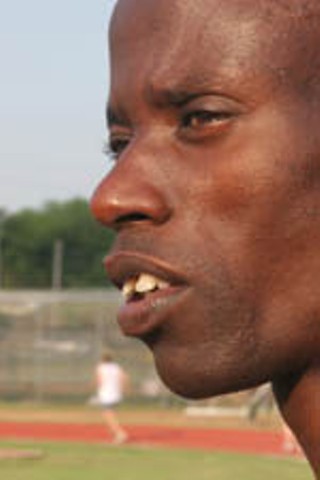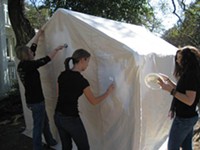The Memories of the Long-Distance Runner
After surviving a holocaust, Gilbert Tuhabonye runs through life to tell his tale
By Rita Radostitz, Fri., May 13, 2005

As he lay amid the dead bodies of his schoolmates, Gilbert Tuhabonye vowed that he would report the massacre "to the police, to the government, to their parents." He didn't believe he would live. And for a time, he wanted to die – he even tried to kill himself to end his suffering. But then he heard a voice telling him to go. To run. To live – so that he could tell the story.
Gilbert Tuhabonye, an accomplished distance runner and trainer who now lives and works in Austin, is originally from the Central African nation of Burundi. He is a Tutsi, one of the two major tribes of his country; the other is the Hutu. On Oct. 21, 1993, Tuhabonye was in his last year of high school, a good student and already a champion runner, looking forward to graduating and attending college in the United States. But that morning as he walked from the dorm to his boarding school classroom in the village of Kibimba, some Hutu classmates began to taunt him: "You will die today." Young Gilbert, who remains an eternally optimistic man with a lightning-quick smile, refused to believe them. But he had been troubled by the ominous silence of the radio. Usually it cackled with news and music. On that day it was mute. A friend told him that the Hutu president of Burundi had been killed in a coup d'etat by the Tutsi-run military earlier that morning. But Gilbert was more concerned about the biology exam he was to take that day. He wasn't afraid of his Hutu neighbors – they had lived peacefully together for many years. They had, in fact, cheered him on at the race he won in a neighboring village the week before.
For about an hour, Gilbert and his classmates sat in the classroom, trying to concentrate, but concerned by what they were hearing outside. Finally, Gilbert went to ask what was going on. "At first, nobody knew," he recalls. But within a few minutes one of his teammates told him, "The Hutu are coming to kill the Tutsi." Gilbert and his classmates decided to try to flee.
As they left the school grounds, they were surrounded by Hutu neighbors wielding bats, sticks, spears, and machetes. Gilbert was one of the first to be struck – perhaps as an example, perhaps because his attackers knew that if he were able to run away they would never catch him. The blow to his chest was so powerful that he would be coughing up blood for weeks.
The students – and other Tutsi villagers – were rounded up and forced into the small schoolhouse. More than 100, perhaps as many as 250, were crowded inside. Many had been badly beaten, others had been cut with machetes, some were already dead. Their Hutu neighbors began to pour gasoline over the dead and the living, and set the school – and the people crammed inside it – on fire.
Gilbert tried to cover himself with anything he could find – shirts, pants, bodies. He heard one boy escape through a window, and then the roar of the crowd outside as they murdered him. "The smell was unbelievable," he says. "Besides the dead bodies, maybe six hours after the killings began, the Hutu had thrown in some toxic chemicals" in an attempt to kill those who were not yet dead. For many hours, Gilbert lay beneath the flames, covered with dead and dying bodies. He despaired, and wanted to die.

But then, he recalls, a voice became strong within him, a voice that told him that he had to survive to tell the story. That voice became his guide. He says he has no other way to explain it other than to believe that God spoke to him. "Something was telling me, 'I am going to protect you,'" Gilbert says. He believes that God told him what to do and how to escape.
Completely desperate, Gilbert used the charred femur of a schoolmate to break a window so he could jump out. There were still Hutus gathered around the school and he was sure they would capture and kill him, but when they saw he was on fire, they didn't give chase: "He will die. Let him die," they chanted, as he hobbled off into the woods. His back was on fire. His arm was charred. His legs barely worked because of the burns. Somehow, he made it into the woods. "I knew I had to get to the hospital that night," he remembers. Despite the agonizing pain of his burned flesh, he eluded the Hutu who were still looking for survivors, and eventually found refuge in the hospital.
Survival Mode
On a warm spring day in March, more than a decade later, Gilbert Tuhabonye sits in his home office in South Austin. Across the room, Gary Brozek, a writer working with Tuhabonye on his autobiography, prepares a tape recorder and sets it on the edge of his subject's desk. "Let's pick up where we left off yesterday," Brozek says. "Right after you got out of the school. What were you feeling?"
"At that point," begins Tuhabonye in his lilting English, "I felt that if they wanted to kill me, that's fine." It had taken him two hours to travel less than a mile away from the school – "My leg hurt so bad." Tuhabonye steadily recalls how he felt as he slogged through the woods in only a pair of undershorts. "I was angry first of all. Disappointed. I had done so much to help the community, and now these people wanted to kill me. They wanted to burn me alive."
Tuhabonye pauses, waiting for another question. "Were you thinking about your family?" Brozek prods.
"I was thinking of so many things. How am I going to get to a Tutsi family?" Tuhabonye explains that he knew that reaching his own family would be impossible, so he asked a Tutsi family for clothes and they refused. The woman wanted to help him, but she was afraid of the repercussions from the Hutus if she did.
"You seemed to be able to keep your wits about you. How did you know what to say to people along the way?" Brozek asks.

Arms crossed against his chest, eyes unmoving, Tuhabonye replies, "I checked into 'survival mode' ... I never used to lie, but I just knew how to lie [to get people to help me]."
The conversation continues. Sometimes Tuhabonye talks for 10 or 15 minutes, recalling, for example, how he finally found the village hospital and hid inside. Then he turns again to Gary: "Okay, ask me another question."
"The Power of God"
Tuhabonye says he made some lucky choices. He hid first in a hospital bathroom, and then in the maternity ward, because he understood the culture – "I knew that the men would respect the maternity ward," a place reserved for women. He waited there, in excruciating pain, until a troop of Tutsi soldiers arrived, to evacuate the hospital of all Tutsis. Tuhabonye was placed in the back of a truck along with some young women who had been left at the hospital by the Hutu mobs so they could return and rape them. The ride was agonizing – every bump a spike of torment – but he understood it was his only chance to get to safety, to survive and tell his story.
"When I laid down in the hospital, I asked: 'Why didn't I die? Why did all my friends die? Why was I saved?'"
In the hospital to which he had been moved, Tuhabonye began reading the Bible. "I questioned, 'How can good people do evil?' Before the attack, I did not have deep faith or religious beliefs. I believed that I was a 'normal Christian.'" But after the attack – "the holocaust," he calls it – "I just realized that it [the voice] was God." He slaps his left hand flat against his right. "I never questioned God, even in the face of evil. God uses people to motivate others." And that, Tuhabonye says, is what motivated him to come back from the brink of death to tell his story. "I think God is using me to share my story."
Rather than abandon his faith, Tuhabonye says that it was "because of the power of God that I was able to get away." Rather than dwell on the massacres, he says that the proper focus is on "what God has done to save me. ... What happened to me," Tuhabonye explains, "I think it is a very interesting story. ... I hope my story will inspire many people."
To Tell the Truth
It was in part Tuhabonye's story – not just the fact that he was an All-American runner for Abilene Christian University – that landed him in Austin. Paul Carrozza, owner of RunTex and an All-American from ACU himself, got a call from his old roommate, who was mentoring Tuhabonye at ACU. It was almost seven years after the massacre, and Tuhabonye had spent many long months rehabilitating his body; first learning to walk again, then to jog, and finally to run. In the interim he had taken a slot at the Olympic training center in Georgia, where he trained for the 1996 Olympics. He was an alternate on the Burundi team, but he didn't get to compete – although he did get to carry the torch during the torch relay. Afterward, he enrolled in La Grande College to improve his English, and was given a scholarship at ACU, where he went on to be a star distance runner.

"Gilbert's running story," says Carrozza, "is only unique because of his survivor story." In 2001, Carrozza offered Tuhabonye a job at RunTex as a runner and coach – and also as a messenger. "I think Gilbert's story is important because it reminds those of us who spend too much time complaining that our latte is not hot enough" that there is a bigger world out there, Carrozza says. Since moving to Austin with his wife and daughter, Tuhabonye has been telling his story to schoolchildren in Austin's MarathonKids program. He also speaks at churches and other groups, and recently the governor has gotten involved. According to Carrozza, "Governor Perry wants to do missionary work with Gilbert, preaching how running changes lives." Gilbert has begun to speak at churches around the state, telling his story and spreading the word about how running saved his life.
But for a long time, he rarely told his story to those he was working with most closely – the runners that he trains as part of his Gilbert's Gazelles running program. One day in 2003, two women from his training group pulled him aside: "How come you never told me you have this amazing story?" Aida Dieck asked. Gilbert recalls them saying, "We'll take you to breakfast and you can tell us your story. We want to help you promote your story."
Dieck contacted a close friend who arranged a meeting with Texas Monthly Editor Evan Smith, who asked staff writer Michael Hall if he might be interested in working with Tuhabonye to write a freelance piece for another magazine or maybe draft a book proposal. Hall met with Gilbert, and afterward told his editors at Texas Monthly, "We've got to tell this story. It is such a great Texas story."
The Texas Monthly article appeared in August 2003 and Tuhabonye became a bit of a celebrity. Dozens of people contacted him wanting to "help" him promote his story – and everybody had an angle. Then one day, he got a call from Tina Jacobson, an agent with a Christian media group. Generally wary of agents with a financial agenda, Tuhabonye met Jacobson on a speaking trip to The Woodlands and felt that she was different. "I can look into somebody's eyes and know if they are a liar or not," he said, "and I saw her there and I knew she would be good. So I signed a contract with her." Jacobson knew a writer in New York she believed would be a good match.
The two men hit it off immediately, and after many phone conversations, Gary Brozek arranged to come to Austin for a long weekend in March. "It has been emotionally exhausting," Tuhabonye admitted about halfway through the weekend. "A lot of people don't know the truth about what happened. But I witnessed those things, and I see this [writing the book] as a way to tell the truth." He sees a connection between his coaching and the importance of telling his story. "Sometimes we complain about the littlest things. You sprain your ankle and think it is the end of the world. But if I can tell my story, then people will know about this bigger thing that happened."
"All the time that I was in the fire," Tuhabonye concluded, "I had the confidence that I would report. To the parents, to the police, to the government. And I was able to report. Part of what I am doing now is continuing to report. To tell the truth about what happened."
Cinema Non Verité
I've known Gilbert Tuhabonye for several years – we both coached at RunTex a few years ago. I had known of his story, and had also talked with him about his experiences in Austin, when he occasionally would meet a Hutu also from Burundi. He explained that "we're just Burundian when we are here," but I remained curious. When the 10th anniversary of the Rwandan genocide arrived, there was lots of press coverage, and I thought of Gilbert and wondered how his story fit into the larger picture. I learned the history of Burundi (see "Burundi: History and Tragedy") When I first talked with him about writing this story, I explained that I thought it was important that people understand that the genocide didn't only happen in Rwanda, but that many Tutsi in Burundi were also massacred.
I thought that the release of the film Hotel Rwanda might provide a good occasion to explain what else happened during that horrible time. As we finished our interviews and I walked away, Gilbert shouted across the parking lot, "You didn't ask me about the movie!"
I had forgotten. "So, did you see it? What did you think?"
"I saw it with Aida and Jennifer. It was good. But it was nothing like what I experienced."
In the film, most of the worst violence, perhaps understandably, takes place offscreen. For Gilbert, even after so many years, it remains all too real and immediate, and as vivid as yesterday. ![]()
Got something to say on the subject? Send a letter to the editor.








